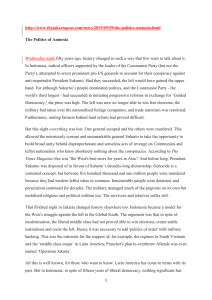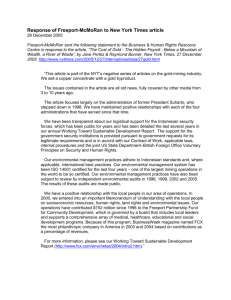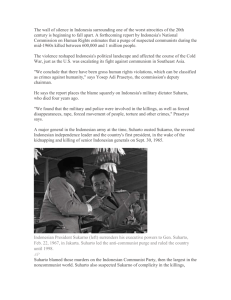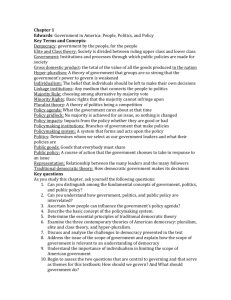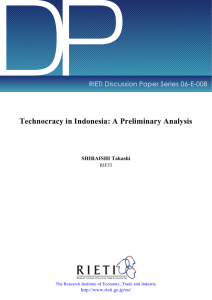Forthcoming in "Bulletin of Concerned Asian Scholars", Vol. 30:3. 1
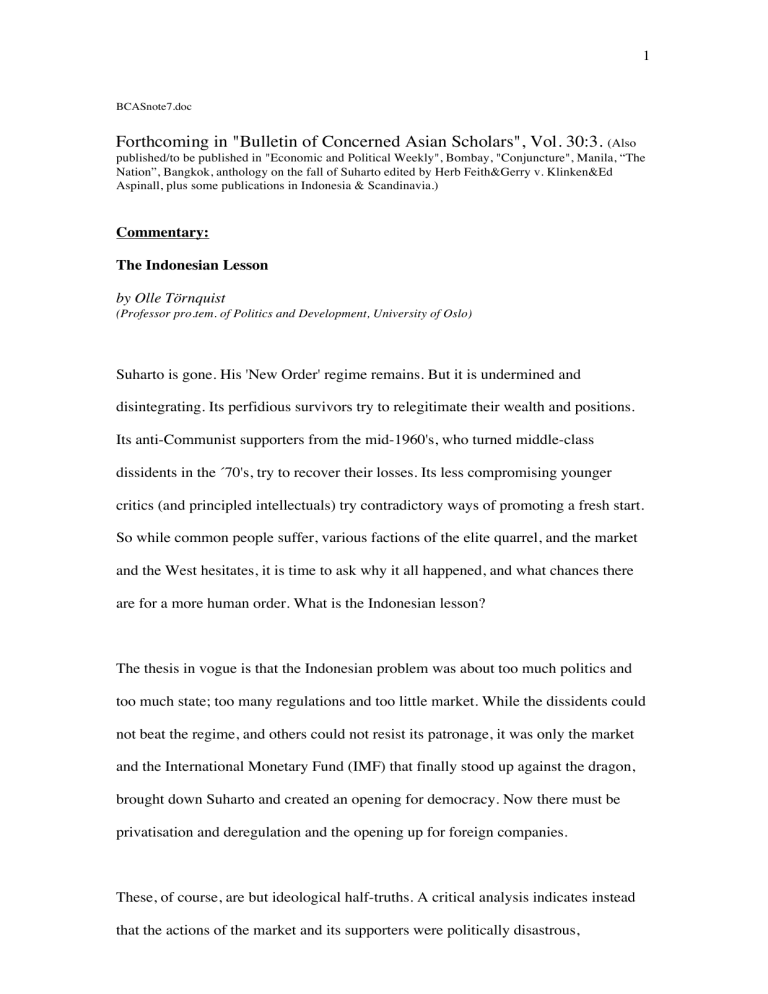
1
BCASnote7.doc
Forthcoming in "Bulletin of Concerned Asian Scholars", Vol. 30:3.
(Also published/to be published in "Economic and Political Weekly", Bombay, "Conjuncture", Manila, “The
Nation”, Bangkok, anthology on the fall of Suharto edited by Herb Feith&Gerry v. Klinken&Ed
Aspinall, plus some publications in Indonesia & Scandinavia.)
Commentary:
The Indonesian Lesson by Olle Törnquist
(Professor pro.tem. of Politics and Development, University of Oslo)
Suharto is gone. His 'New Order' regime remains. But it is undermined and disintegrating. Its perfidious survivors try to relegitimate their wealth and positions.
Its anti-Communist supporters from the mid-1960's, who turned middle-class dissidents in the ´70's, try to recover their losses. Its less compromising younger critics (and principled intellectuals) try contradictory ways of promoting a fresh start.
So while common people suffer, various factions of the elite quarrel, and the market and the West hesitates, it is time to ask why it all happened, and what chances there are for a more human order. What is the Indonesian lesson?
The thesis in vogue is that the Indonesian problem was about too much politics and too much state; too many regulations and too little market. While the dissidents could not beat the regime, and others could not resist its patronage, it was only the market and the International Monetary Fund (IMF) that finally stood up against the dragon, brought down Suharto and created an opening for democracy. Now there must be privatisation and deregulation and the opening up for foreign companies.
These, of course, are but ideological half-truths. A critical analysis indicates instead that the actions of the market and its supporters were politically disastrous,
contributed to a socio-economic catastrophe, obstructed democratisation, and only accidentally helped do away with Suharto.
The crisis was not because of too much politics...
To begin with, the economic crisis did not result from excessive regulations but from bad regulations, and from too little popular influence .
Bad regulations that were exploited by special interests with the state, business and international finance; and too little popular influence capable of holding such special interests in check. As elsewhere in East Asia, the serious problems did not develop until private interests become stronger and deregulation increased. Then the regime was unable to coordinate the new groupings and could only hold down discontent among the new middle and working classes.
...but the problem was political
Further, once the Indonesian crisis had erupted, conventional economic measures did not work. Many observers began to realise, therefore, that the basic problem was political rather than economic. Suddenly even conclusions drawn from critical analyses of the mid-1996 crackdown on the democracy-movement were no longer ignored: that is, that dissidents were too poorly organised to make a difference yet had to be supported since the regime was totally unable to regulate conflicts, reform itself, and prepare an "orderly" succession. But even though it became increasingly apparent that the crisis could only be solved through fundamental political changes, little was done to support rapid development of the only alternative – the democracy movement and the moderate reformists. Suharto's monopolies were no longer appreciated – but temporary stability was.
2
3
"If you had only been able to give us an alternative," the West derogatorily told democracy activists who faced an uphill battle after a recent crackdown and decades of repression and "floating mass" politics.
Actually, the West itself had been contributing to those difficulties of generating an alternative. Much of Sukarno's authoritarian nationalism in the late-1950's was because the Dutch refused to give up their colonial interests; because the CIA supported separatist movements; and because the West wanted to prevent the communists and their unique modern interest-based mass movements from wining liberal democratic elections. Thereafter Western powers paved the way for the military take over and the massacres in 1965-66. Their favourite liberal and so-called socialist administrators did not have a strong enough social and economic base to make a difference, so the United States in particular turned to the army instead.
According to the conventional cold war wisdom of the West (and professor
Huntington's then forthcoming "politics of order" theory), the army would serve in policing and containing the masses, thereby allowing liberal middle class experts to run the country. But as we know, once the Left had been massacred, and many others jailed, harassed and domesticated, it was rather the army generals who took over – with the middle-class experts as their servants. And yet, the repression, corruption and nepotism that followed were also sustained by political and extensive economic support from the West, including loans issued on the basis of political guarantees rather than on well-founded economic evaluations. Neither the IMF&Partners nor various corporate leaders, had anything decisively negative to say about Suharto's
Indonesia till hours before the crisis broke out. On the contrary, Indonesia was on the
World Bank's top-ten list of promising emerging economies.
4
Economic recipes deepen the crisis
Moreover, as the Indonesian crisis evolved from September 1997 onwards, the West not only abstained from betting on democrats and moderate reformists to tackle the basic political problems but instead referred the matter to neo-classical IMF economists. From October 1997 onwards their narrow minded recipes diminished confidence in Indonesia's ability to avoid an economic break-down. (Officials in the
IMF and the World Bank later on admitted this themselves.) The situation deteriorated. Suharto had to look for alternatives – and to create additional problems by nominating a vice-president whom nobody would prefer to himself, Habibie. By
January 1988 the currency fell beyond imagination, the economy came to a standstill, people began to protest, anti-Chinese riots spread, and the regime was on the brink of collapse. According to the World Bank, no country has suffered a similarly harsh economic backlash since the Second World War.
In fact, however, the economic backlash was like the U.S. bombing of Baghdad during the Gulf War. Suharto was just as able to turn the negative into a positive, putting the blame on the West (and on the Chinese business community), as the West was unable to find an alternative to him. He was reappointed president in March and formed a provocative kind of combat government with his daughter 'Tutut' as de facto prime minister and an absolute majority of family friends and loyalists in other posts.
Concessions to stability
Faced with the threat of a new Saddam Hussein, the West retreated. Too many business interests were at stake in Indonesia. Forty percent of the world's shipping passes through its straits. Just before Easter, the IMF adopted Australia's and Japan's so-called flexible positions and postponed some of its own far-reaching demands.
5
This, of course, was a perfectly rational political decision. Given the situation and the interests of the powerful parties involved, democratisation as well as neo-liberal marketism had to give way to stability. If food and fuel subsides had really been withdrawn by April, as the IMF initially requested, this would have been an invitation to massive riots. Meanwhile the World Bank & C:o tried to mobilise food and medical relief to meet immediate needs (worth 3 billion dollars), and trusted the military to keep people in check. The regime had got another temporary lease on life, it seemed.
Inconceivable price hikes and early resignation
My own analysis showed a weakness at this point. For on April 10 the Indonesian government managed to convince the IMF that essential subsidies should only be reduced step-by-step until October in order to prevent major social and political unrest. But less than an month later, on May 4, the regime and the IMF agreed instead, quite unexpectedly, to increase the price of petrol by as much as 70 percent and of kerosene by 25 percent. Suharto went further than the IMF had sought – and the IMF applauded. I still cannot understand how even neo-classical economists could make such a politically irrational decision. Perhaps Suharto had lost touch altogether, while politically illiterate economists in Jakarta were short of money and wanted to impress their equally naive IMF colleagues in Washington as well as their critics in the U.S. Congress.
Predictably, anyway, the new prices generated immediate public anger. This gave a new dimension to the student demonstrations that had hitherto been rather isolated, though increasing in number. In Medan, anti-Chinese riots and looting erupted and
spread to Jakarta, where, a week later, the situation got out of hand. Demonstrating students were killed. Rioting and looting led to the burning to death of hundreds of people in shopping centres and to widespread acts of cruelty, including the rape of women of Chinese descent. Some of the excesses were aggravated by hard-liners in the armed forces who wanted an excuse for more forceful intervention. But their provocations backfired. More and more people turned against the regime. The students occupied the parliament and no longer allowed themselves to be abused downtown. Suharto tried without success to win back the initiative by promising various reforms. He saved his skin only by resigning early, as the "rats" (like the parliament speaker and several cabinet ministers) began to abandon the sinking ship.
From breakdown to democracy?
The Indonesian lesson is, thus, about the inability of the market, civil society and their proponents to prevent social and economic disaster for Indonesia's almost 200 million citizens by betting on political reform, popular representation, and democratisation.
Once again the market and civil society libertarians have been proven wrong.
But does not this break down create an opening for democratisation? The waters we sail into with this proposition are both uncharted and rough. I see four major problems.
To begin with, most actors focus on how to alter the old regime that still remains.
Everybody is busy repositioning themselves, consolidating their assets, and forming new parties and alliances. Incumbents (and their military and business allies) are delaying changes in order to be able to adapt, making whatever concessions are
6
7 necessary to be able to steer their course. Established dissidents trade in their reputations and, occasionally, their popular followings, for reforms and "positions".
Radicals try to sustain popular protests to weaken shameless incumbents who might otherwise be able to stay on. The market and the West are interested in anything that looks stable enough to permit the pay-back of loans and safe returns on investments.
It is hard to predict the outcome – except to say that as ordinary people get hungry the conflicts are likely to continue, escalate, and, at worst, open up for more extensive military and religious involvement.
Meanwhile many donor agencies and students of society add that a weak democratic culture and civil society are equally problematic. Culture in terms of informal norms and patterns certainly become more important when organised institutions and rules of the game are weakened and even disintegrate. Yet, I do not share the view that support for civil society is always the best way of building a democratic culture. In many cases, such as the backing of free journalists, there are no problems, but all civil society associations do not necessarily promote democracy. And what is political culture but routinely practised remnants of yesterday's rules, institutions and organised politics? Hence, it is on the latter level of formal rules, institutions, and organised politics at which change and improvements have to start.
Thirdly, therefore, the fact that giving priority to the organising of constituencies based on shared interests and ideas does not make much sense among leading political actors in Indonesia is a more serious problem than a weak democratic culture. Even democrats go for short-cuts like charisma, populism, religion, and patronage in order to swiftly incorporate rather than gradually integrate people into politics. There is a shortage of time, of course, and everybody is afraid of losing out.
8
But a common lesson learned from other transitions away from authoritarian rule is that without well-anchored politics and unionism there will be no meaningful democracy. And the conditions today are worse than they were during Indonesia's period of parliamentary democracy in the ´50's, which ended in authoritarianism – or in the Philippines after Marcos, were populist bossism now prevails.
Finally, we also know from other cases that the few genuine democrats who might be able to build such popular and well-rooted parties and unions are in desperate need of supportive rules of the game. At the same time, the progressive movements are rarely interested in such constitutional and legal formalities, until they later on have to fight uphill battles within unfavourable political systems.
In conclusion, it is difficult for the Indonesians to learn from other experiences, given the current dynamics and the weakly organised democracy movement. Right now successful betting on popular organising and more favourable rules would be possible only if the West gave us much support to democratisation as it has to Indonesia's financial recovery. This is unlikely given the fact that the West has not so far been able to break out of its vicious circle of recurrent re-creation of the authoritarian
Indonesian beast in order to rather help awakening its potentially democratic beauty.
The more likely outcome, therefore, is rather a 'bad-guy democracy'; within which incumbent bosses on various levels are able to survive, attract military and business allies, co-opt some dissidents, and mobilise mass-support through Islamic populism – all well before genuine democratic activists and ordinary people manage to organise themselves.
17, June, 1998
